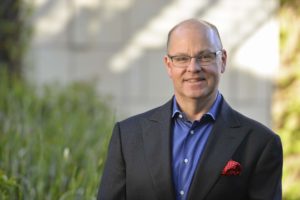Stanford’s Mark Lemley on Effort to Make IP Available to End COVID-19 Pandemic
A new initiative, the Open COVID Pledge has been launched to urge universities and companies to free up intellectual property (IP) to spur development of treatments and cures for COVID-19, now spreading rapidly through the world. Here, IP law expert Professor Mark Lemley, a founding member, discusses the initiative.

What was the impetus for this initiative?
A group of scientists and lawyers were concerned that intellectual property rights, which are designed to drive innovation, might end up restricting it by discouraging researchers from working on technologies that others might own. And we also wanted to make sure that everyone has access to the technology needed to mass-produce masks, ventilators, and testing kits.
What is the goal and how do you hope to achieve it?
Our aim is to boost cooperation and make IP widely available to end the coronavirus pandemic. Companies, institutions, and universities would give free licenses to their patents, copyrights and certain other property rights to anyone developing technologies for the diagnosis, prevention, or treatment of COVID-19, the disease caused by the new coronavirus. These licenses would last until a year after the World Health Organization has declared the coronavirus pandemic to be over. This is not a permanent grant of rights, but a temporary measure to make sure that we aren’t restricting research, testing, or treatment during the pandemic.

I know it’s early days, but do you have an indication about how open companies and universities are to the pledge?
Companies might be reluctant to do this if they thought they were the only ones, so the commitment provides a way for universities and companies to feel comfortable that they are not alone. A number of companies, like Medtronic, have already come forward with promises to open their technology. I hope other companies and universities will join them in committing not use IP as a tool to gain a competitive advantage in the short term at the expense of public health.
What will happen to companies that are formed from this effort and important discoveries made using IP that is freed up?
The pledge prevents them from being sued for things they do during the pandemic. Once things return to normal, we hope companies will work together to come up with commercially reasonable license terms, but they can go back to owning and asserting their IP.
Can you talk about the Open COVID Pledge license?
While we have written a model license anyone can use, many universities and companies have their own license language and terms, and that’s fine. We are encouraging them to commit to the pledge (a short statement at opencovidpledge.org), and they can do that while implementing the pledge with their own license terms.
Mark Lemley is the William H. Neukom Professor of Law at Stanford Law School and the Director of the Stanford Program in Law, Science and Technology. He is also a Senior Fellow at the Stanford Institute for Economic Policy Research and affiliated faculty in the Symbolic Systems program. In addition to teaching, he also litigates and counsels clients in all areas of intellectual property, antitrust, and internet law as a founding partner of Durie Tangri LLP.
